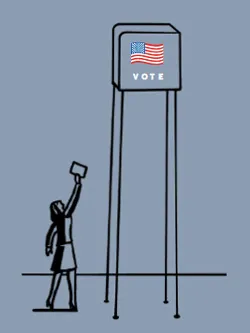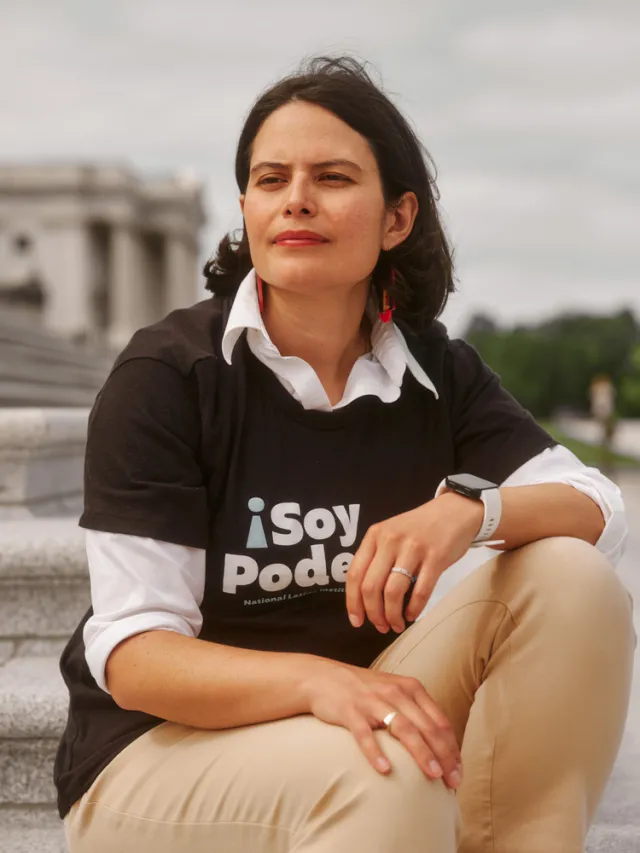My Body, But Not My Choice
Alum News
Navigating a post-Roe world with abortion-rights advocates Candace Gibson ’07 and Genevieve Scott ’06

Published August 1, 2022
Few social issues in our country are more contentious, or more in turmoil, than reproductive rights. In June, the U.S. Supreme Court ruled in Dobbs v. Jackson Women’s Health Organization, ending almost 50 years of federal protection for abortion under Roe v. Wade. The Center for Reproductive Rights argued the case on behalf of Mississippi’s sole abortion clinic to block the state’s ban on abortion after 15 weeks of pregnancy.
Politico reported in early May that the court planned to overturn Roe, drawing on a leaked draft opinion written by Justice Samuel Alito. Alito contended in both the draft and the final opinion that “it is time to heed the Constitution and return the issue of abortion to the people’s elected representatives”—in other words, to the states.
Twenty-six states will or are likely to ban abortion, according to the Guttmacher Institute, a research group that supports abortion rights. In all, more than 500 restrictions on abortion in 42 states have been introduced in 2022. Some states have tried to pass laws modeled on Texas Senate Bill 8 (S.B. 8), which bans abortion around the sixth week of pregnancy with no exceptions for incest or rape. It also empowers anyone to sue those who aid an abortion in any way, with a potential $10,000 reward.
A CBS News poll released two days after Roe was overturned found that 59% of Americans disapproved of the ruling. Among women, 67% disapproved. The Los Angeles Times pointed out that five justices overturned Roe; 91% of the senators who confirmed them were men. In a letter to the Smith community, President Kathleen McCartney wrote, “For those of us who fought for a woman’s right to choose whether or not to have a child, this decision is hard to believe and hard to bear.”
THIS COULD BE a moment of political reckoning, where people recognize what has been lost and what has always been at stake.
Abortion pills account for the majority of U.S. abortions. There will be new legal battles over their availability by mail. Senate Minority Leader Mitch McConnell has said that a national abortion ban is possible if Republicans assume control of Congress and the presidency. What’s more, Justice Clarence Thomas wrote in his Dobbs opinion that the court should reconsider past decisions permitting same-sex intimacy, same-sex marriage, and contraceptives.
We talked with Candace Gibson ’07 from the National Latina Institute for Reproductive Justice and Genevieve Scott ’06 from the Center for Reproductive Rights about what may lie ahead. Both spoke for themselves rather than on behalf of their organizations. The conversation has been edited for length and clarity. Our discussion took place before the U.S. Supreme Court’s decision but anticipated the end of Roe.
Some useful context, no matter your political viewpoint: Nearly one in four U.S. women will have an abortion by age 45, according to the Guttmacher Institute. Fifty-nine percent are mothers who already have children. The Turnaway study from the University of California, San Francisco, found that women who do not obtain a wanted abortion are more likely to subsequently face economic hardship, including insufficient money to pay for housing and food.
In a Gallup poll released a day before the Dobbs decision, only 25% of Americans said they feel confident in the Supreme Court. It was the lowest result in 50 years of Gallup polling on the question.
Candace Gibson ’07: Community-Based Advocate
Photograph by Jared Soares
Candace Gibson ’07 grew up in Salt Lake City in a home filled with lively political conversations. Her grandfather immigrated to the United States in 1967 from El Salvador, where he worked on the railroads and tried to organize a union. Her grandmother, mother, and uncle followed, leaving a familiar community and culture for the promise of greater economic opportunity.
Gibson’s grandparents became factory workers; her mother, a laundress and teacher’s aide. The family faced harassment just for speaking Spanish to one another at the grocery store. But Gibson learned to be a feminist from her mother, carrying that perspective through her government and international relations studies at Smith and later at the University of Utah’s law school.
Today, Gibson is director of government relations at the National Latina Institute for Reproductive Justice. Headquartered in New York City, the nonprofit works nationally on policy advocacy, leadership development, community mobilization, and culture change.
“As a reproductive justice organization, we’re community rooted and believe that people who are closest to the problem are those who should decide and lead whatever solutions are required,” Gibson says. Part of her role is to elevate the voices of Latinas and Latinxs in federal policy conversations and ensure policies are responsive to the communities she serves.
The work is a way to honor her mother’s and grandparents’ sacrifices to be in this country “so that I could choose a career path that was meaningful to me and allows me to give back to a larger community,” Gibson says.
“When I see and hear the work that my colleagues are doing to change hearts and minds within their own communities, I know that we are creating long-lasting changes that will have an impact for generations.”
What’s the state of reproductive rights in the U.S.?
CANDACE GIBSON: For many communities—Black and brown communities, people living with disabilities, those with low incomes—reproductive rights and the promise of Roe have been unfulfilled.
In 1976, you had the Hyde Amendment. Many of us think of that as the original abortion ban. The Hyde Amendment is a federal policy rider that prohibits federal funding to be used for abortion coverage in the Medicaid program. Many communities rely on Medicaid as their form of health insurance.
Then you see the number of restrictions that have been placed over the decades. It’s been a frightening pace.
GENEVIEVE SCOTT: Literally hundreds of state restrictions seek to make it more difficult, time-consuming, expensive, and, frankly speaking, undignified for pregnant people to be able to access a fundamental right.
S.B. 8 in Texas attempts to insulate what is blatantly unconstitutional under almost 50 years of legal precedent, starting with Roe v. Wade, saying you cannot ban abortion prior to viability. It allows an end run around the Constitution because the Texas Legislature bars government officials from directly enforcing it. It deputizes private citizens to enforce the law, allowing any person who’s not a government official to bring a civil lawsuit against literally anyone who provides an abortion or “aids and abets” such an abortion.
The court’s decision in the challenge to S.B. 8 [declining to block the law] has already had insanely catastrophic consequences not just for reproductive rights but for our country.
As Justice Sonia Sotomayor explained in her dissent, this decision clears the way for other states to not only perfect what was done in Texas on limiting reproductive rights but to be able to infringe upon any right that has been recognized by the U.S. Supreme Court that the state happens to disagree with.
How did we get here? Is it as simple as three new conservative Supreme Court justices?
GIBSON: Part of it is we still have a culture that stigmatizes conversations around sexual reproductive health care, sexual desires, and the evidence that people need to make the best health care decisions for themselves and their families.
What we’ve seen in the progressive movement is we’ve fallen behind. The opposition laid the groundwork through the states to eventually have a case that could go to the Supreme Court to overturn Roe. They built up that policy leadership to advance those types of anti-choice ideas. The progressive movement is now catching up, trying to build that infrastructure.
The Democrats have those who are very progressive. They also have Sen. Joe Manchin, who is not a champion on this issue. They have to work together. There isn’t necessarily a party that can be completely supportive of abortion rights. We see more Democrats getting involved, but it’s taken a lot of work for us to get there.
Genevieve Scott ’06: Freedom Fighter
Photograph by Beth Perkins
When Genevieve Scott ’06 was in high school, a harrowing phone call from a friend changed her life.
The friend needed medical attention after abuse from her father but was afraid to go to the hospital, believing state law required her father’s arrest. Scott says she will never forget “the terrible fear I felt for her safety and the intense frustration I felt about the law—presumably intended to protect victims—that had the practical effect of inhibiting access to health care.”
She later learned in a law and feminism class at Smith how the law could be used to secure and protect fundamental rights. That class helped cement her interest in serving her country by protecting the nation’s most basic freedoms.
After earning a law degree from the University of Pennsylvania, Scott worked for the ACLU of Michigan, among other organizations, before joining the Center for Reproductive Rights in 2014. As senior counsel with the U.S. litigation team, she leads challenges to restrictions on reproductive health care throughout the United States in state and federal courts. The center has brought some of the most-watched reproductive rights cases before the U.S. Supreme Court, including Dobbs v. Jackson Women’s Health Organization in Mississippi.
Eighty-nine percent of U.S. counties don’t have a single abortion clinic, Scott points out. “I’ll paraphrase Gloria Steinem ’56, who said, for women, real equality has to do with the ability to decide whether, when, and how many children to have. We will not attain equality in this country without it.”
What will our nation look like without a federal right to abortion?
GIBSON: We’re going to continue to see that patchwork of access to abortion care. The inequities will only worsen for many communities that have already been systematically discriminated against in this country.
More individuals won’t be able to jump through all the hoops—setting up child care, taking time off of work. If you are driving out of state, do you have gas money? If you are undocumented, are you willing to possibly risk your family or yourself getting deported?
For folks who are privileged, I wonder what will happen to them, too. We might be going to a time, like Gloria Steinem ’56 said, where you’ll have to travel to Europe or another country for an abortion.
SCOTT: There will be vast inequalities in access based on class, geographic location, and race.
There could be serious increases in costs as clinics have to undertake the enormous logistical challenge of figuring out how to increase access in states where access will continue to be allowed. Since S.B. 8 took effect, clinics in Oklahoma have seen a 646% increase in Texas patients. [Editor’s note: After this conversation, the Oklahoma Legislature passed the nation’s strictest anti-abortion law. Modeled on the Texas law, it goes further, outlawing abortion starting at fertilization in most cases.]
This could be a moment of political reckoning, where people recognize what has been lost and what has always been at stake.
Has any federal legislation been introduced to counter these trends?
SCOTT: The Women’s Health Protection Act [WHPA] would enshrine the right to abortion in federal law and protect the right to provide and to access abortion care free from medically unnecessary restrictions and bans on abortion. In September, we had a historic vote at the U.S. House of Representatives in favor of WHPA. We also had a vote in the Senate in February that was not successful. No surprise that it didn’t receive the 60 votes needed to overcome the filibuster. [Editor’s note: In May, the U.S. Senate voted again on WHPA. The legislation failed to pass for the second time in a 49–51 vote.]
There is companion legislation that would remove obstacles to accessing affordable, nondiscriminatory, and quality reproductive health care called the Equal Access to Abortion Coverage in Health Insurance Act. The EACH Act would ensure every person who receives health care or insurance through the federal government will still have coverage for abortion care. It’s effectively something that is meant to undo the Hyde Amendment.
I would urge people to consider writing their representatives and senators about the significance of these bills.
POLICYMAKERS with authoritarian impulses will use this strategy to further control gender equality and sexuality.
GIBSON: There have also been enormous efforts at the state and local level to expand access to abortion care. Oregon, for example, has passed a Reproductive Health Equity Act to ensure that individuals have access to the full range of health care regardless of their source of insurance coverage.
SCOTT: We’re going to see this be fought out in states throughout the country, especially in swing states. We’ll see ballot initiatives to try to add a right to abortion to state constitutions or to try to take it away. We’ll see enormous arguments over who will sit on state courts and state supreme courts.
Gloria Steinem ’56 has said that controlling reproduction is the first step toward authoritarianism. Do you agree? If so, what’s the implication for democracy?
GIBSON: I do agree. We need to provide some nuance here, because we have lived in a democracy that has controlled reproduction for certain communities historically, starting with enslaved individuals, and then the forced sterilization of many communities, including people with disabilities, Indigenous women, Latinas, women of low incomes.
I think we will continue seeing a trend where policymakers with authoritarian impulses will use this strategy to further control gender equality and sexuality. In Hungary, under Prime Minister Viktor Orbán’s direction, they’ve consolidated the media, rolled back women’s rights, attacked LGBTQ people. Under the Trump administration, the United States signed on to the Geneva Consensus, which declares broad opposition to abortion rights.
When you’re no longer able to exercise your ability to decide if, when, and how you want to form a family and to be able to provide for that family, how can you function as a citizen of this country?
Some readers may wonder, “What can I do?”
GIBSON: Call your members of Congress. Be active in state and local politics. Abortion funds and other mutual aid groups need funding right now.
At the Latina Institute, we’ve supported civil rights organizations in calling for eliminating the filibuster, which is key because we’ve seen how it’s being used to hinder the ability for us to secure meaningful legislation. Whatever issue that you’re passionate about, we do need democracy reform in this country to ensure that people’s desires are represented at all levels of governance.
There’s also a role for supporting people in your life who have had abortions, and those who are trying to tell their stories about accessing abortion care. The more we create an environment where people can tell those stories, the less abortion care will be stigmatized.
SCOTT: I would encourage people to vote in their state legislative elections. State legislators are redrawing the lines in our country and gerrymandering to undermine voting rights. And anytime there’s an election for a state judge, especially for state supreme court, vote if you can.
What would you say to those who believe abortion is murder and against God’s will?
GIBSON: I believe abortion is a fundamental human right. There are progressive faith leaders who are pro-abortion and who are trying to ensure that their constituencies are elevating these conversations regarding reproductive rights.
SCOTT: I represent abortion providers who bring claims on behalf of pregnant people in their state to be able to access their rights. Almost every provider I’ve spoken to throughout the country has a story about somebody who pickets outside their clinic and has come in for an abortion themselves.
Sometimes those people are too ashamed to tell their community what they’ve done, and they go back to picketing afterward. Sometimes those people think their abortion is different, that their circumstances are so unique as to justify the decision in their case but not others.
I would say that I trust women and all pregnant people to make the right choice for their body in their life, based on their unique circumstances.
This story appears in the Summer 2022 issue of the Smith Alumnae Quarterly.
Democracy in Distress
A Special Series

Introduction by Erin Pineda
What is democracy? This seemingly simple question has a seemingly obvious answer: It means, literally and etymologically, that the people rule themselves. But this straightforward reply leads to a tangle of thorny questions: How, exactly, are the people meant to rule themselves? What institutions and procedures enable the people’s rule? Are there limitations on the exercise of popular power—on what the people can elect to do?
PART 1: My Body, But Not My Choice by Andrea Cooper ’83
Navigating a post-Roe world with Candace Gibson ’07 of the National Latina Institute for Reproductive Justice and Genevieve Scott ’06 of the Center for Reproductive Rights.
PART 2: Block the Vote by Andrea Cooper ’83
Voter suppression laws are on the rise. But Smithies are fighting back, working to expand political participation by eliminating ballot restrictions and empowering disenfranchised voters.
PART 3: BANNED by Andrea Cooper ’83
The debate over what constitutes “appropriate” content jeopardizes the open exchange of ideas.
PART 4: When Culture Wars Come for Kids by Oliver Haug ’20
Transgender youth are being attacked by a barrage of new legislation. These Smithies have their backs.
Illustration by Anthony Russo
Hundreds participate in the May 14 Bans Off Our Bodies rally in Northampton. Photograph by Emily Thurlow / Daily Hampshire Gazette

